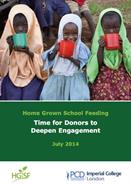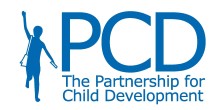 News
News  HGSF: Time for Donors to Deepen Engagement
HGSF: Time for Donors to Deepen Engagement
 A new policy paper, "Home Grown School Feeding: Time for Donors to Deepen Engagement", from Imperial College London's Partnership for Child Development analyses official donor involvement with HGSF, and recommends how it can be put further up donors’ agendas to increase potential impacts for farmers, children and the economic development of countries.
A new policy paper, "Home Grown School Feeding: Time for Donors to Deepen Engagement", from Imperial College London's Partnership for Child Development analyses official donor involvement with HGSF, and recommends how it can be put further up donors’ agendas to increase potential impacts for farmers, children and the economic development of countries.
The HGSF model where school meals made with food procured from local smallholder farmers can be described as a “win-win” - providing smallholder farmers with a fixed income, as well as enabling well fed children to learn and develop into healthy adults.
Despite the benefits of HGSF, donor support for this model varies considerably. As significant challenges remain in meeting global development goals on hunger, education and poverty, focusing attention on HGSF and other such innovative approaches which link agriculture, health and education sectors is crucial.
The paper explores how HGSF works in practice, with case studies drawn from sub-Saharan Africa. An analysis is also provided on the potential benefits as well as challenges associated with making HGSF work as equitably and effectively as possible.
Recommendations
The paper outlines that key donors including the EU, the UK Government have not put HGSF as a priority, unlike other international agencies such as the World Food Programme and the World Bank. Specifically:
- The UK Government has not recognised the efficacy of HGSF despite its multiple benefits
- EU funding is largely focused on the nutrition of under 5s
The paper calls on donors to:
- Put HGSF into social protection, education, nutrition and agricultural development policies and strategies
- Invest in research
- Provide technical support to governments looking to implement the programmes
- Facilitate south-south cooperation



